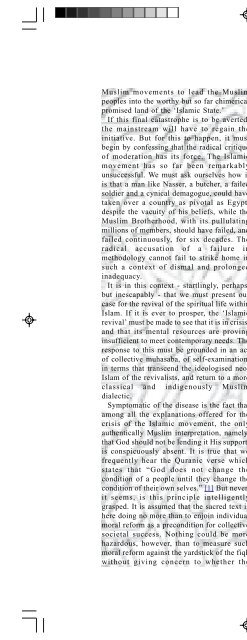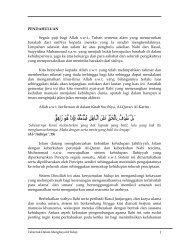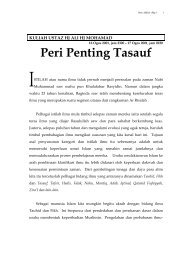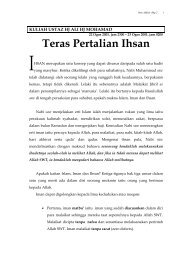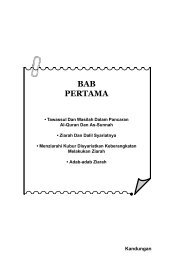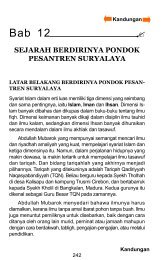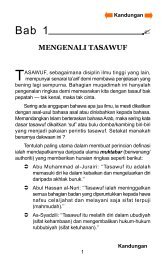inab3 cover front.psd - Khadijah Mosque
inab3 cover front.psd - Khadijah Mosque
inab3 cover front.psd - Khadijah Mosque
You also want an ePaper? Increase the reach of your titles
YUMPU automatically turns print PDFs into web optimized ePapers that Google loves.
Muslim movements to lead the Muslim<br />
peoples into the worthy but so far chimerical<br />
promised land of the ‘Islamic State.’<br />
If this final catastrophe is to be averted,<br />
the mainstream will have to regain the<br />
initiative. But for this to happen, it must<br />
begin by confessing that the radical critique<br />
of moderation has its force. The Islamic<br />
movement has so far been remarkably<br />
unsuccessful. We must ask ourselves how it<br />
is that a man like Nasser, a butcher, a failed<br />
soldier and a cynical demagogue, could have<br />
taken over a country as pivotal as Egypt,<br />
despite the vacuity of his beliefs, while the<br />
Muslim Brotherhood, with its pullulating<br />
millions of members, should have failed, and<br />
failed continuously, for six decades. The<br />
radical accusation of a failure in<br />
methodology cannot fail to strike home in<br />
such a context of dismal and prolonged<br />
inadequacy.<br />
It is in this context - startlingly, perhaps,<br />
but inescapably - that we must present our<br />
case for the revival of the spiritual life within<br />
Islam. If it is ever to prosper, the ‘Islamic<br />
revival’ must be made to see that it is in crisis,<br />
and that its mental resources are proving<br />
insufficient to meet contemporary needs. The<br />
response to this must be grounded in an act<br />
of collective muhasaba, of self-examination,<br />
in terms that transcend the ideologised neo-<br />
Islam of the revivalists, and return to a more<br />
classical and indigenously Muslim<br />
dialectic.<br />
Symptomatic of the disease is the fact that<br />
among all the explanations offered for the<br />
crisis of the Islamic movement, the only<br />
authentically Muslim interpretation, namely,<br />
that God should not be lending it His support,<br />
is conspicuously absent. It is true that we<br />
frequently hear the Quranic verse which<br />
states that “God does not change the<br />
condition of a people until they change the<br />
condition of their own selves.” [1] But never,<br />
it seems, is this principle intelligently<br />
grasped. It is assumed that the sacred text is<br />
here doing no more than to enjoin individual<br />
moral reform as a precondition for collective<br />
societal success. Nothing could be more<br />
hazardous, however, than to measure such<br />
moral reform against the yardstick of the fiqh<br />
without giving concern to whether the<br />
virtues gained have been acquired through<br />
conformity (a relatively simple task), or<br />
proceed spontaneously from a genuine<br />
realignment of the soul. The verse is speaking<br />
of a spiritual change, specifically, a<br />
transformation of the nafs of the believers -<br />
not a moral one. And as the Blessed Prophet<br />
never tired of reminding us, there is little value<br />
in outward conformity to the rules unless<br />
this conformity is mirrored and engendered<br />
by an authentically righteous disposition of<br />
the heart. ‘No-one shall enter the Garden by<br />
his works,’ as he expressed it. Meanwhile,<br />
the profoundly judgmental and works -<br />
oriented tenor of modern revivalist Islam (we<br />
must shun the problematic buzz-word<br />
‘fundamentalism’), fixated on visible<br />
manifestations of morality, has failed to<br />
address the underlying question of what<br />
revelation is for. For it is theological<br />
nonsense to suggest that God’s final concern<br />
is with our ability to conform to a complex<br />
set of rules. His concern is rather that we<br />
should be restored, through our labours and<br />
His grace, to that state of purity and<br />
equilibrium with which we were born. The<br />
rules are a vital means to that end, and are<br />
facilitated by it. But they do not take its<br />
place.<br />
To make this point, the Holy Quran deploys<br />
a striking metaphor. In Sura Ibrahim, verses<br />
24 to 26, we read:<br />
Have you not seen how God coineth a<br />
likeness: a goodly word like a goodly tree,<br />
the root whereof is set firm, its branch in the<br />
heaven? It bringeth forth its fruit at every<br />
time, by the leave of its Lord. Thus doth God<br />
coin likenesses for men, that perhaps they<br />
may reflect. And the likeness of an evil word<br />
is that of an evil tree that hath been torn up<br />
by the root from upon the earth, possessed<br />
of no stability.<br />
According to the scholars of tafsir<br />
(exegesis), the reference here is to the<br />
‘words’ (kalima) of faith and unfaith. The<br />
former is illustrated as a natural growth,<br />
whose florescence of moral and intellectual<br />
achievement is nourished by firm roots,<br />
which in turn denote the basis of faith: the<br />
quality of the proofs one has received, and<br />
the certainty and sound awareness of God<br />
which alone signify that one is firmly<br />
Masjid <strong>Khadijah</strong> 55


